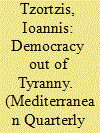|
|
|
Sort Order |
|
|
|
Items / Page
|
|
|
|
|
|
|
| Srl | Item |
| 1 |
ID:
148648


|
|
|
|
|
| Summary/Abstract |
This essay presents the findings of comparative research on democratic transitions by reforma in Greece, Spain, and Turkey but in a framework not previously used and one rather different from the one established in the now-classical study of democratic transitions set by Guillermo O’Donnell and Laurence Whitehead in the 1980s. The departing point of this comparative approach is a case unknown to many: the ill-fated 1973 Greek attempt at self-transformation, known as “the Markezinis experiment” after Spyros Markezinis, who assumed the task of bringing the country to democracy in the way Adolfo Suárez González would do in Spain four years later. The attempt stalled before it was ended by a coup organized by the regime hard-liners tacitly backed by the military as an institution. The cases compared include Spain and Turkey, which underwent similar transitions, but with very different outcomes: consolidated democracy and “difficult democracy,” respectively. The reasons are sought in the different regime natures and elite and counterelite choices.
|
|
|
|
|
|
|
|
|
|
|
|
|
|
|
|
| 2 |
ID:
161688


|
|
|
|
|
| Summary/Abstract |
This paper critically examines recent responses by and interactions between stakeholders in negotiating the acceptability of aircraft noise standards in Australia in order to help inform debate in Britain. It investigates the interplay of the politics of noise with the broader land use planning context focusing on the role of government, airports, community interests, and the development sector. Different local environments inevitably frame diverse contexts, but the pervasive challenge is in securing the acceptable trade‐off between the economic dividends promised by airports and local quality of life. Discussion is structured around four main issues: an introduction to the Australian politics of airport noise, an historical timeline of key contextual events, identification of the major actors in the noise governance framework, and a focus on an issue of increasing political significance, namely the different positions of airports and developers in the increasing intensification of urban development.
|
|
|
|
|
|
|
|
|
|
|
|
|
|
|
|
| 3 |
ID:
172883


|
|
|
|
|
| Summary/Abstract |
How grave is the threat that populist leaders pose to democracy? To elucidate the prospects of the United States under president Donald Trump, I conduct a wide-ranging comparative analysis of populism’s regime impact in Europe and Latin America. The investigation finds that the risks have been overestimated. Populist leaders manage to suffocate democracy only when two crucial conditions coincide. First, institutional weakness, which comes in various types, creates vulnerabilities to populist power grabs. Second, even in weaker institutional settings populist leaders can only succeed with their illiberal machinations if acute yet resolvable crises or extraordinary bonanzas give them overwhelming support which enables them to override and dismantle institutional constraints to power concentration. Because none of these conditions prevail in the United States, an undemocratic involution is very unlikely. First, the federal system of checks and balances, rooted in an unusually rigid constitution, remains firm and stable. Second, President Trump encountered neither acute crises nor a huge windfall; consequently, his mass support has remained limited. Facing strong resistance from an energized opposition party and a vibrant civil society, the U.S. populist cannot destroy democracy. Instead, Trump’s transgressions of norms of civility have sparked an intense counter-mobilization that may inadvertently revitalize U.S. democracy.
|
|
|
|
|
|
|
|
|
|
|
|
|
|
|
|
|
|
|
|
|